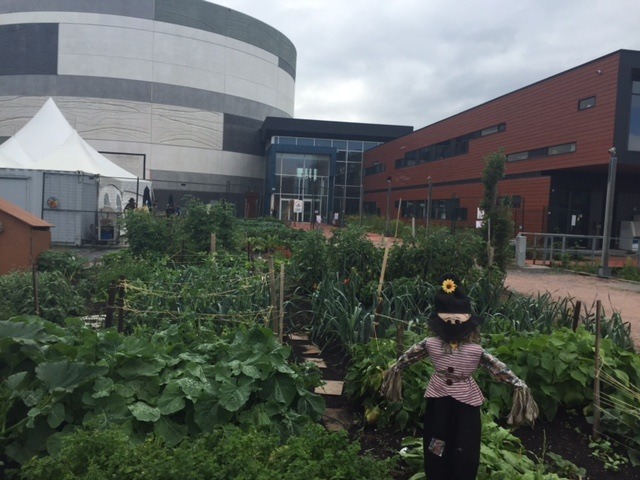5 Reasons You'll Fall In Love With Montreal
Most people travel for the museums, to try new restaurants, or to take selfies with, say, Mickey Mouse or the Grand Canyon.
I have a completely different reason for leaving home. I travel to get inspired, to see what's possible when I step out of my box.
Which is why I have fallen hard and deep for Montreal. On a recent trip, I was so inspired that I kept pumping my fists in the air and yelling, "Yes!" I met real-life superheroes, witnessed communities working together on innovative solutions, and regained my faith in the crazy progressive idea that all of us can thrive.
Here are the top five reasons I adore Quebec's largest city:
#1 It's the City Most Likely to Survive an Apocalypse
Why? Because Montreal's urban agriculture scene is alive and thriving. Eating local, to the Quebecois, means growing food yourself in your own back alley. This island city of roughly 1.6 million people has dozens and dozens of community gardens. One city farm manages to grow a whopping 220 tons of produce a year...on a rooftop!
Even though its growing season is on the short side, Montreal and its independent-minded citizenry are at the forefront of green growing practices, obsessed with their vertical gardens, green alleyways, and green rooftops. A permanent city committee on urban gardening has the sole purpose of promoting ecologically sound food production. Let's just say that if the apocalypse comes, the forward-thinking denizens of Montreal will barely notice. They can take care of themselves, thank you very much.
#2 Community Still Matters
Big, prosperous cities sometimes seem cold and uncaring. In Montreal, 19 boroughs ranging from the cobblestoned Vieux-Montreal to the bohemian neighborhood of Plateau take great pride in their respective communities. Dedicated community members work side by side to turn junk heaps into gardens, to paint murals on the sides of old buildings, and to turn forgotten alleyways into salad bowls.
The government supports community projects, rewards initiative, and even ponies up funds for compost beds, or paint, or starter plants.
I enjoyed a delightful lunch on the rooftop (next to one of three gardens) of Santropol Roulant, a nonprofit that brings people together through the cultivation of...well, food. It all started in 1995 when two charitable-leaning waiters from Café Santropol started a meals-on-wheels program.
To this day, young, eager volunteers on bicycles provide meals made from garden-fresh vegetables. No pap or mush for these senior citizens. Santropol Roulant has more than 100 volunteers and also offers educational workshops, neighborhood markets, and five collectives that do everything from bike repair to urban fruit tree harvesting to edible fungi cultivation.
Another great example is Cirque du Soleil and the National Circus School that converted a 475-acre landfill into one of the world's largest gathering places for circus arts. Called La TOHU (it's a French term that means "fertile confusion and renewal"), this non-profit built a LEED-certified performance space (it's round, made entirely out of recyclables, and uses electricity transformed from landfill gas) hosts visitors to the recycling center and gives environmental safaris.
And in an effort to live by their stated social economy principles, La TOHU also refuses to hire anybody who doesn't live right there in the once-impoverished Saint-Michel environmental complex. This site that was once a limestone quarry and a monstrous landfill is now an inspiring green space with three miles of bike paths and free events for guests to gather and ooh and aah over such innovations as a micro-power station that converts bio-gas from the landfill into electricity and an ice bunker cooling system visible through a glass floor.
#3 Adults Ride Bikes
Montreal deserves its designation as North America's most bike-friendly metropolis. With more than 400 miles of bike paths, hundreds of self-service BIXI bike sharing stations, and an activist biking community, it's estimated that half the adult population rides a bike at least once a week. The city even plows bicycle lanes in the winter. Every year there's a huge celebration called Tour de L'Ile where tens of thousands of riders take over the streets, purposely reminding politicians and other officials how much Montreal values its two-wheeled constituency.
I was able to get in on the action by taking a bike tour with the amazing and inspiring Danny Pavlopoulos, co-owner of Spade & Palacio Tours. Born and raised in Montreal, Danny is a licensed city guide, a passionate urban cyclist, a lover of street art, and a craft beer nerd. If you really want to see the heart and soul of this one-of-a-kind city, call Danny.
#4 It's Abuzz with Innovation
Unlike most regions where bee populations are in rapid decline, Montreal has hundreds of bee hives. You'll find them on rooftops, on balconies, and right there in the backyard next to Fido's doghouse.
Thanks to three ingenious 20-somethings whose company installs and helps homeowners maintain beehives, Montreal has become a honeybee's Garden of Eden. According to Étienne Lapierre, one of three founders of Alveole, Montreal is better for bees than the countryside because of its floral diversity, pesticide bans, and ample rooftop space.
Lapierre and his co-founders are so passionate about bees that they produce a calendar every year featuring tasteful but nude photos of beekeepers and their docile, non-threatening (really!) honey-making worker bees.
#5 It's The Home of Justin Trudeau
Marvel Comics didn't put Montreal's favorite son on the cover of a recent comic book for nothing. Canada's tattooed Prime Minister is a real-life superhero, having been a teacher, a snowboard instructor, an actor, and a compassionate voice during the Syrian refugee crisis. Since being sworn in on November 4, 2015, he has worked to rebuild relations with indigenous people and has imposed a rigorous carbon-capture policy. No wonder Canada ranks second globally as the best country for social progress, raking in top scores for supporting basic human needs, rights, and foundations of well-being. (For the record, Finland, which I also love, is first.)
